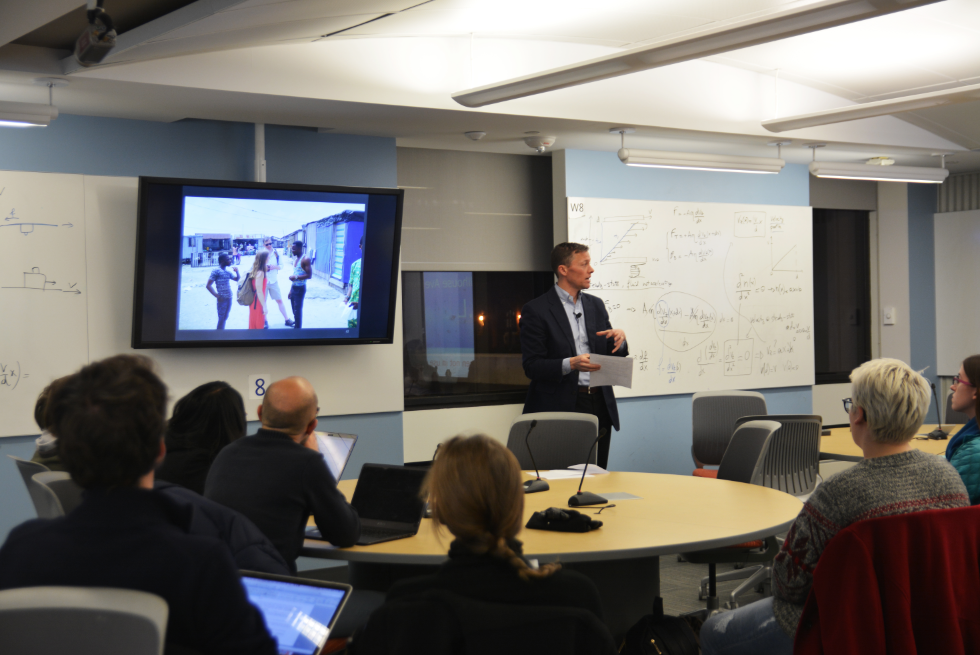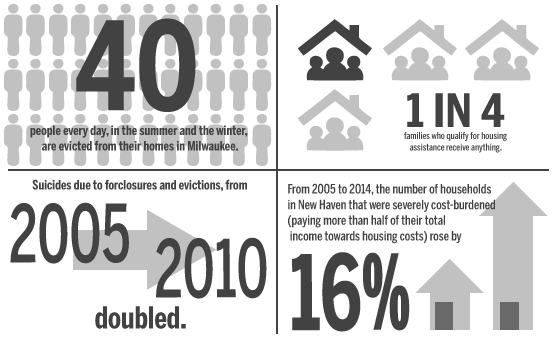
Harvard sociology professor Matthew Desmond discussed the broken housing system plaguing cities across the United States, touching on topics applicable to the city of New Haven.
Well over 50 students, faculty and community members attended Monday night’s event at 17 Hillhouse Ave. Desmond used his personal history to guide conversation. For over a year, he lived in trailer parks in some of the worst neighborhoods of Milwaukee and Wisconsin and followed families being evicted as well as landlords evicting their tenants. Along with field data, Desmond used the story of Arlene, a single mother of two children who was repeatedly displaced to illustrate the shattering impact of evictions.
“Home is the center of life, it’s our refuge. At home we’re ourselves — everywhere else, we’re someone else,” Desmond said. “Eviction is a driver, not just a condition, of poverty.”
The first time Arlene was evicted her family moved between homeless shelters, drug-ridden apartment complexes and dilapidated residences, in one instance being forced out of their home after the city found their house unfit for human habitation, Desmond recounted. Often, each new location was more poverty stricken than the last.
Desmond’s Milwaukee Area Renters Study, a survey of over 1,000 renters and 100,000 eviction cases, broadly reflected this cycle of forced moves bringing about drops in neighborhood quality. He said the study sought to find the rate of evictions, who they most often happened to and their long term consequences. A team worked on the ground to carry out the study, interviewing in neighborhoods where evictions had occurred.
In a broader overview of this topic, Desmond found that the problem of eviction does not solely afflict Milwaukee, WI.

Broader national trends of flatlining income and soaring housing costs, such as a 70 percent increase between 1995 and today in median asking rent and a 52 percent rise in fuels and utilities costs in the 2000s, have exacerbated the problem, Desmond said. Often, the government does little to help those in need. Many times, only one in four families who qualify for housing assistance actually receives it, while an even smaller fraction, 15 percent, of these families receive public housing.
“This level of negligence would be unthinkable for other basic needs that the government provides, such as food stamps,” Desmond said.
On the local level, Desmond estimated that 40 people in Milwaukee are evicted each day. The trends are similar in other cities such as Cleveland, Kansas City and Chicago, where one in 14 renter homes in the inner city experiences an eviction annually, Desmond said.
Additionally, Desmond noted that trends of eviction disproportionately affect women and families with children. Desmond explained that children often cause trouble and women can end up bringing nuisance citations for landlords when making 911 calls in instances of domestic violence, exacerbating the tensions toward eviction.
Talking to landlords in low-income developments also helped Desmond answer the question of why someone would own property in the poorest neighborhoods. While the mortgage and property taxes in the poorest neighborhoods were much lower than elsewhere in the city, rent rates were fairly similar — meaning that landlords in these areas could collect high profit margins. Many of these landlords denied housing to those with eviction records, which are public in the state of Wisconsin, and would in some circumstances remove a home’s doors or short-circuit its electricity to force a tenant to expedite an eviction.
Desmond noted that housing issues are a global problem, as an increasing percentage of the human population lives in urban areas. In fact, it is expected that 1.6 billion people worldwide will live in substandard or unaffordable housing by 2025. Nonetheless, he acknowledged progress made over the last century to combat city slums, as well as current work done by local organizations to improve homelessness and housing.
Important change would still need to come through the political system, Desmond said. He mentioned an expansion of the federal housing voucher program, known as section 8, to everyone below the poverty line as an initiative with enormous potential impact. The program has already lifted 2.8 million citizens into more stable lives, allowing them to use their vouchers to live wherever they choose. Desmond estimated that $26 to 27 billion per year would be needed to expand the voucher program to all those living under 30 percent of the median income. Desmond highlighted that the government already spends $171 billion per year on the mortgage interest deduction, which essentially only benefits middle and upper class families.
“We already have a national subsidy — just not for the poor,” Desmond said. “The first thing they do with their freed income [from housing vouchers] is to go to the grocery store and feed their children. But for [Arlene’s family] and many like them, their rent eats first.”
Andrew Papachristos, a sociology professor at Yale, helped organize the talk, describing Desmond’s public sociology as the type of work many at Yale value. He further emphasized the high regard sociologists have for Desmond’s work, as a master ethnographer with an ability to view every perspective on a problem.
According to Yale professor of sociology Ron Eyerman, Desmond’s work represents the best that social science can do, by making a social problem visible through groundwork and sophisticated statistical analyses. He added that Desmond’s work crucially doesn’t stop with highlighting the problem, but also helps define solutions.
Nicole Licata Grant ’98, president of the board of Christian Community Action, a service organization that works with housing and homelessness issues, said New Haven is comparable to many big American cities that face similar housing issues.
“New Haven is really a microcosm of a lot of what’s going on in big American cities, particularly in the Northeast because of the way that communities are structured, property taxes and individual ownership of homes and properties,”said Licata Grant, president of the board of Christian Community Action, a service organization that works with housing and homelessness issues. “There’s maybe an extra layer of complications around making housing more equitable.”
A recent study conducted by DataHaven, a New Haven based data analysis group, shows that the number of severely cost-burdened households — those which pay more than half of their total income towards housing — rose by 16 percent in the county of New Haven between 2005 and 2014.
Executive Director of DataHaven Mark Abraham described these figures as part of the organization’s larger goal to inform the needs of the community.
“There’s really a large number of adults in New Haven who struggle to pay for housing and food, and local data on housing needs is very important to our partners in social services and city planning,” Abraham said.
He described the fairly high frequency with which evictions are mentioned at New Haven community meetings and the 70 percent rate of renting households in the city.
Additionally, he said Section 8 housing vouchers and other federal actions are critical.
“A lot of development housing has been pushed to the periphery of the city, often out of places with economic opportunities,” said Adam Rawlings, community building specialist for Neighborhood Housing Services, an organization that works to increase responsible homeownership and revitalize neighborhoods in New Haven. “There are also many social pressures around affordable housing, both in terms of neighborhood residents and how people feel about living in affordable housing.”
The financial pains of the 2008 recession and its associated unemployment and underemployment are linked to the evictions and foreclosures around New Haven, Rawlings added. He also mentioned examples of housing projects with negligent owners — such as the Church Street South housing complex — who view their role of providing livable housing as secondary to business needs.
“I think the bottom-line is that housing is never something that occurs in a vacuum, and there are a variety of intersecting forces at play affecting the success or failure of a housing project,” Rawlings said. “We have to be willing to look outside our own echo chambers to find ideas that work elsewhere.”
Desmond was awarded a MacArthur Foundation “Genius” grant in 2015, which gives “no-strings-attached” fellowships to selected individuals.
Interested in getting more news about New Haven? Join our newsletter!







